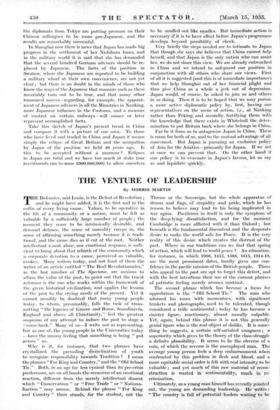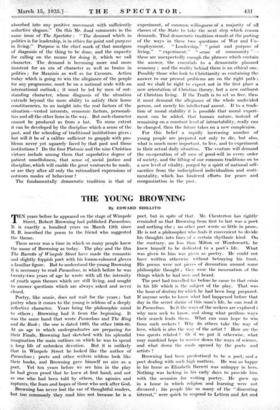THE VENTURE OF LEADERSHIP
By MORRIS MARTIN
THE Defensive, said Lenin, is the Defeat of Revolution and he might have added, It is the first nail hi the coffin of every living cause. Values, to be operative in the life of a community or a nation, must be felt as • valuable by a sufficiently large number of people; the moment they cease to be intrinsically desirable, and demand defence, the sense of unreality creeps in, the sense of affirming something merely because it is tradi- tional; and the cause dies as if cut at the root. Neither intellectual asent alone, nor -emotional response, is suffi- cient to bring about that rebirth of the community which • a corporate devotion to a cause, perceived as valuable, evokes. Many writers today, and not least of them the writer of an article entitled "The Real Revolutionaries," in the last number of The Spectator, are anxious to affirm the value of the past, to point out that the truest reformer is the one who works within the . framework of the given historical civilization, and applies the lessons of the past to the crying needs' of the present. Yet it cannot possibly he doubted that many young people today, to whom, presumably, falls the task of trans- mitting "the legacies of Greece and Rome, Scandinavia, England and above all Christianity," feel the greatest suspicion of any attempt to induce the past to stage a "come-back." Many of us-1 -write not as representing, but as one of, the young people in the Universities today —have the uneasy feeling that 'something is being "put across " us.
Why is it, for instance, that two phrases have crystallized the prevailing disinclination of youth to recognize responsibility towards Tradition ? I mean the phrases "For King and Country," and the "Old-School Tie." Both, in an age far less 'cynical than its pre-Trisis • predecessor, are on all hands the occasiems of an emotional reaction, different from the merely intellectual -dissent .which " Conservatism " or ". Free Trade" or " Nationa- lization " may arouse. Behind . the phrase "For• King and Country" there stands,' for the. student, not—the Throne or the .Sovereign, but the whole apparatus of drums and flags, of stupidity and pride, which he has reason to believe may lead to his being implicated in war again. Pacificism in itself is only the symptom of the deep-lying dissatisfaction; and for the moment Cambridge is more afflicted with it than Oxford; but beneath is the fundamental discontent and the desperate desire to make the world safe for Peace. It is -the very reality of this desire which creates the distrust of the past. Where in our traditions can we find that spring of action, which will lead to World peace ? An education, for instance, in which 1066, 1415, 1588, 1815, 1914-18, are the most prominent 'dates, hardly gives one con- fidence in the pacific Mission of the British people. Those who appeal to the past are apt to forget this defect, and with the best intentions their use of the current phrases Of patriotic feeling merely arouses Mistrust. The second phrase which has become a focus for opprobrium is the "Old School Tie." The mail who adorned his room with -mernentcies, with significant trinkets and photographs, used to be tolerated, though considered a trifle sentimental ; today he has become a sinister figure, reactionary, almost morally culpable.
Yet, again, behind this phrase it is not this generally genial' figure who is the real object of dislike." It is some- thing he suggests, a certain self-satisfied smugness ; a superiority which gives to the theory of the class-struggle a definite plausibility. It seems to be the obverse of a coin, of which the reverse is the unemployed Man. The 'average young person feels a deep embarrassment when confronted by this problem in flesh and blood, and a more equitable social order is felt with real intensity to be valuable ; and yet much of' this raw material of recon; .struction is wasted in Sentimentality, much in re= ernn' ination.
- Ultimately; as a young man himselfhas re2ently pointed out; the' Young. are demanding leadership.. He' .Writes : " The' cotmtry"is 'full' a- potentialleadeis Waiting to be absorbed into any positive movement with sufficiently seductive slogans." On this Mr. Joad contents in the same issue of The Spectator : "The demand which in politics is for leadership, is in ethics for point and purpose in living." Purpose is the chief mark of that amalgam of diagnosis of the thing to be done, and the capacity for calling on the means for doing it, which we call character. The demand is becoming more and more insistent for an era of character as well as brains in politics; for Mazzinis as well as for Cavoms. Action today which is going to win the allegiance of the people for any programme, must be on a national scale with an -international outlook ;, it ,must be led by men of out- standing character, whose diagnosis of the situation extends beyond the mere ability to satisfy their home constituencies, to an insight into the real factors of the situation—vested interests, economic .factors, personali- ties and all the other lions in the way. But such character cannot be produced as from a hat. To seine extent it can be developed by the discipline which a sense of the past, and the schooling of 'traditional institutions gives ; but will it be of a calibre sufficient to grapple with pro- blems never yet squarely faced by that past and those institutions ? Do the four Platonic and the nine Christian virtues include among them that superlative degree of patient unselfishness, that sense oc, social justice and discipline, which will enable the great venture to be made, or are they after all only the rationalized expressions of outworn modes of behaviour ? , The fundamentally democratic tradition is that of experiment, of common willingness of a majority of all classes of the State to take the next step which reason demands. That democratic tradition stands at the parting of the ways in these two questions of War and Un- employment. "Leadership," ". point and purpose of living," " experiment," " sense of community "— . these are unexpectedly enough the phrases which contain the answer, the essentials to a democratic planned economy and the reality behind them is an ethical one. Possibly those who look to Christianity as containing the answer to our present problems are on the right path ; and we shall be right to expect not in the first place a new orientation of Christian theory, but a new outburst of Christian living. If the Truth is to set us free, then it must demand the allegiance of the whole undivided person, not merely his intellectual assent. If to a tradi- tion of moral stability it is possible that moral experi- ment , can be added, that human nature, instead of remaining on a constant level of intractability, really can , be changed, then the future takes on a new complexion.
For this belief a rapidly increasing number of young people are Prepared not only to die, but also, what is much more important, to live, and to experiment in their actual daily situation. The venture will demand the co-operation of all men of good-will in every order of society, and the lifting of our .common traditions on to a new level of vitality, purged by a spirit of national self- sacrifice from the indiseiplined individualism and senti- mentality, which, has hindered efforts for peace and reorganization in the past.











































 Previous page
Previous page